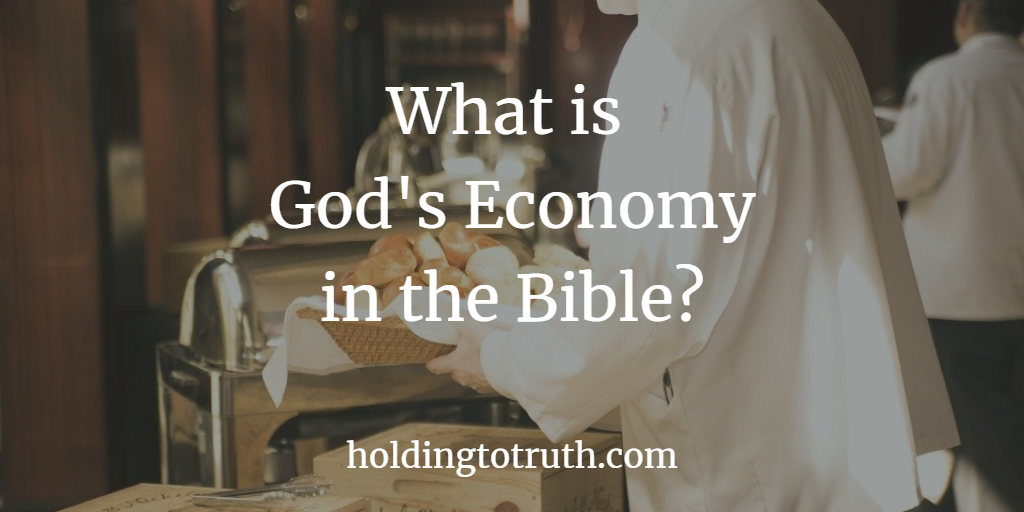Holding to Truth in Love on God's Economy
What is God’s Economy in the Bible?
by Tom Smith | 7 Comments
What is “God’s economy”? It’s crucial to ask this question. Why? Because it’s a great mystery in the Bible, one that opens up God’s entire plan for man.
You may be asking, How does this compare to economics like you study about in school? Very simply, an economy is a plan for distributing resources. A good economy is one in which needed resources move efficiently to adequately supply people’s needs.
But how does that relate to God?
What is God’s economy?
In 1 Timothy 1:3-4, the apostle Paul focused on God’s economy. There he directed his young coworker, Timothy to,
Charge certain ones not to teach different things nor to give heed to myths and unending genealogies, which produce questionings rather than God’s economy, which is in faith.
All the differing teachings of Paul’s day were distracting the believers from the central matter of God’s economy.
But what did Paul mean by God’s economy? Let’s define terms.
“Economy” is the anglicized form of the Greek word oikonomia. The word is of two parts: 1) oikos meaning house and 2) nomos meaning law or administration. It is a household arrangement for distributing the riches of a family to the members of the household.
In ancient times, a wealthy family would have such an arrangement, carried out by a household steward. The steward’s job was to make sure all the members received adequate food, clothing and other provisions. God has such an economy to care for the needs of His great household.
God’s eternal plan – the heart’s desire of God
God is infinitely rich. His riches include all that He is to us for our enjoyment. God is rich in His divine attributes—love, light, holiness and righteousness.
Yet God is a mystery. God’s substance, the nature of His person, is Spirit (John 4:24).
Consider for a moment, the wealth of information distributed over wireless transmissions. Your eyes can not see them, nor can your ears hear them. How can you enjoy this wealth of information? You need the proper receiver—your cell phone.
God has a good pleasure which He purposed in Himself—Eph. 1:9-10
This mysterious God has a good pleasure to distribute Himself freely. This is His purpose, His will, and ultimately His glory (Eph. 3:21; Rev. 21:10-11).
He wants all the riches of His being to be distributed to us, to be enjoyed by us, and to be expressed through us.
To carry out this purpose, God made an economy, a divine plan, with an arrangement for distributing Himself.
God created us as His vessels—Gen. 2:7, 9
First, God needed some vessels or containers to receive Him. So He created man in His image (Gen. 1:26). Like a glove made to contain a hand, we were made to contain God.
The Bible says God created us as His vessels, His containers, to receive His riches. Romans 9:23-24 says, "In order that He [God] might make known the riches of His glory upon vessels of mercy, which He had before prepared unto glory, even us."
But we are not simple containers like a glove or a bottle. We were created as vessels with three parts—body, soul and spirit (Gen. 2:7). Our spirit is the organ created to receive and contain God. Then God placed this man into a garden, with the tree of life at its center for him to eat of (v. 9). This reveals God’s intention to dispense Himself into man.
Satan damaged God’s vessels with sin—Gen. 3:1-6
Realizing that God had a special desire with man, Satan came in to damage them. By speaking lies, Satan injected doubts against God into them and deceived them to eat of the tree of knowledge of good and evil which God had forbidden man to eat (2:19).
Their disobedience was not merely a sinful act. They received the poison of sin causing them to be fully corrupted and useless in carrying out God’s economy.
Man became no longer a vessel fit for God’s dispensing. Man’s body became the flesh of sin. His soul became the enemy of God. Man’s spirit became deadened (Eph. 2:1), unable to contact God and receive God.
Christ came to redeem us as God’s vessels—Eph. 1:7
The only way for God to fulfill His plan was to become a Man Himself. John 1:1 and 14 say, "In the beginning was the Word, and the Word was with God, and the Word was God….And the Word became flesh and tabernacled among us…"
The infinite God became a finite man of flesh and blood. This was Jesus, the God-man—the complete God and perfect, sinless man. He lived 33 1/2 years of perfect, sinless human living to make God and His plan known to man. Then Jesus, the God-man, went to the cross to redeem us, paying the price of His own blood to recover us as vessels for God’s economy (1 Pet. 1:18-19).
Christ removed every barrier between us and the holy and righteous God so that God might again have the standing to impart Himself into us.
The life-giving Spirit imparts God into us—1 Cor. 15:45
Not only did Christ die to redeem us. Through His death, He became a life-giving Spirit to impart all the fullness of God into us.
First Corinthians 15:45 says, "So also it is written, “The first man, Adam, became a living soul”; the last Adam became a life-giving Spirit.
Essentially, God has never changed. He is eternally one God, who is Father, Son and Holy Spirit (Matt. 28:19). Yet, in God’s economy, all that this Triune God is was embodied in Christ (Col. 2:9). Then through His death and resurrection, this One became the Spirit (2 Cor. 3:17). Now, as the Spirit, Christ is able to distribute, to dispense, all that the mysterious God is into us for our enjoyment.
Our spirit is the receiver for God’s dispensing—John 4:24
In God’s economy, this dispensing God became the life-giving Spirit to reach us. We also have a human spirit able to contact Him and receive Him. John 4:24 says, "God is Spirit, and those who worship Him must worship in spirit and truthfulness."
So when we believe in Jesus, not only does God forgive our sins. He enlivens our deadened spirit (Eph. 2:5). At that moment, our enlivened spirit contacts His life-giving Spirit and a dispensing takes place. The two spirits are joined as one (1 Cor. 6:17).
It is in this union of the two spirits that God’s economy is fulfilled. Take a moment to pray,
O Lord, thank you for revealing your economy to me. Thank you for creating me as a vessel to contain You. I believe that You came as the perfect God-man to die for me, to redeem me from sin. I also thank you for becoming the life-giving Spirit to dispense God into me. Lord, I open to You. I receive You right now. Dispense Yourself into me more every day. I love You.
The church displays God’s wisdom in His economy—Eph. 3:9-11
However, if we only care for our personal receiving, we fall short of the complete view of God’s economy. God does not merely want a bunch of saved sinners. God wants all the saved ones to be built up as Christ’s one Body, the church. It is this built up, corporate Body that will make God’s wisdom known to the entire universe including Satan and all the angelic powers.
Paul presents this profound truth in Ephesians 3:9-11,
9 And to enlighten all that they may see what the economy of the mystery is, which throughout the ages has been hidden in God, who created all things,
10 In order that now to the rulers and the authorities in the heavenlies the multifarious wisdom of God might be made known through the church,
11 According to the eternal purpose which He made in Christ Jesus our Lord,
However, the greatness of the church in God’s economy requires many more posts to develop.
The believers’ stewardship – the commission we receive from the Lord
When this economy is with God, it is His purpose or plan for distributing Himself. However, when this economy is entrusted to us it becomes our stewardship. It is the same Greek word oikonomia but from another angle. Ephesians 3:2 says, "If indeed you have heard of the stewardship of the grace of God which was given to me for you."
When we see God’s economy, we will sense that this is our commission. We will realize that we must cooperate with God to freely distribute His riches to others. This is more than leading sinners to be saved. It is to impart to them the riches of Christ given to us.
The divine dispensing – the dispensing of God into us, His vessels
God’s economy, His oikonomia, is also His dispensing. First, we receive His dispensing for ourselves. Then, as God’s stewards or stewardesses, we dispense the riches of Christ to people for their enjoyment. We are like flight attendants on an airplane carrying out a dispensing service to those around us.
How can we participate in God’s economy?
- First, we need to realize that we are God’s vessels made to receive Him (John 1:12).
- Second, we need to receive the Lord Jesus by believing in our heart that God raised Him from the dead and opening our mouth to confess that Jesus is our Lord (Rom. 10:8-13).
- Third, we need to continually call on the Lord Jesus, thank Him, praise Him, and pray to Him so that He can dispense Himself into us (v. 13; 1 Thes. 5:17-20).
- Fourth, we need to seek out those who are living in this divine economy, to be built up as the church, for God’s full expression (Eph. 3:16-21).
- Fifth, we need to practice our stewardship by dispensing the riches of Christ into the many empty vessels around us (v. 8).



